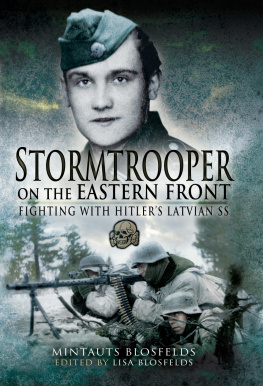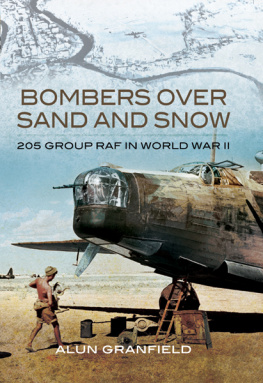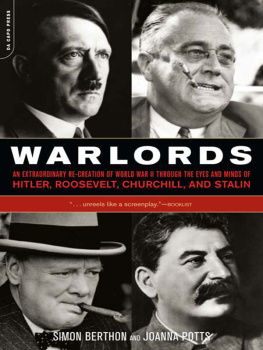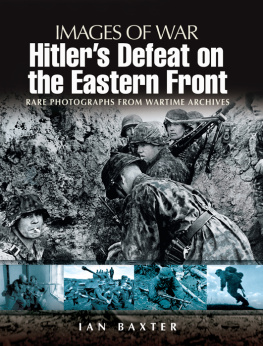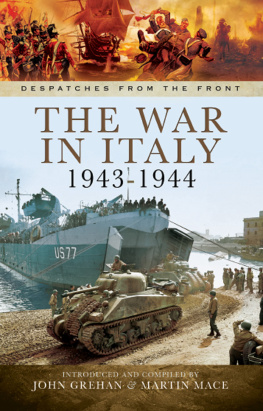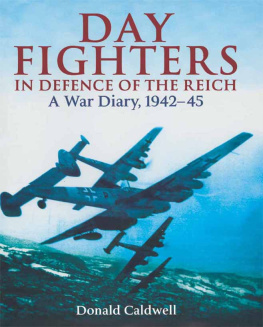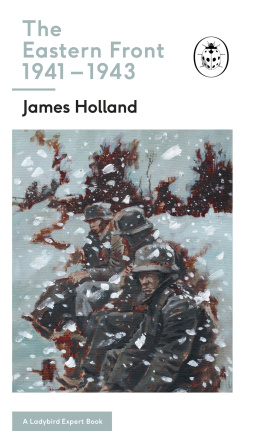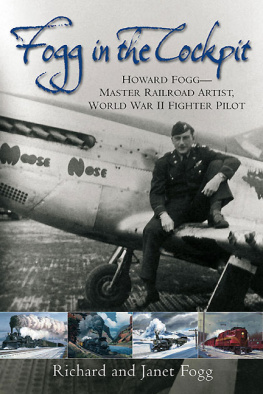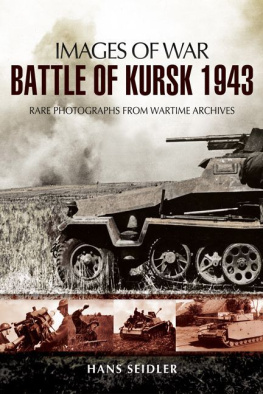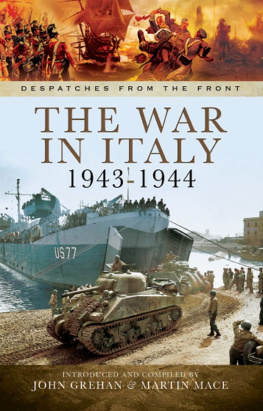

First published in Great Britain in 2008 by Pen & Sword Military
an imprint of
Pen & Sword Books Ltd
47 Church Street
Barnsley
South Yorkshire
S70 2AS
Copyright Lisa Blosfelds 2008
ISBN 978 1 84415 720 4
ISBN 978 1 84468 289 8 (ebook)
The right of Lisa Blosfelds to be identified as Editor of this Work has been asserted by her in accordance with the Copyright, Designs and Patents Act 1988.
A CIP catalogue record for this book is available from the British Library.
All rights reserved. No part of this book may be reproduced or transmitted in any form or by any means, electronic or mechanical including photocopying, recording or by any information storage and retrieval system, without permission from the Publisher in writing.
Typeset in Sabon by Phoenix Typesetting, Auldgirth, Dumfriesshire
Printed and bound in England by Biddles Ltd, Kings Lynn
Pen & Sword Books Ltd incorporates the imprints of Pen & Sword Aviation, Pen & Sword Maritime, Pen & Sword Military, Wharncliffe Local History, Pen & Sword Select, Pen & Sword Military Classics and Leo Cooper.
For a complete list of Pen & Sword titles please contact
PEN & SWORD BOOKS LIMITED
47 Church Street, Barnsley, South Yorkshire, S70 2AS, England
E-mail: enquiries@pen-and-sword.co.uk
Website: www.pen-and-sword.co.uk
Contents
This book comprises an edited version of an account my father wrote of life in Latvia and his experiences in the Latvian Legion during the Second World War. The parts omitted comprise: a lengthy account of life in Latvia under the first occupation of the country by the Russians, and during the German occupation before my father was old enough to be called up to serve in the armed forces (these parts would have made the book about half as long again had they been included): material only likely to be of interest to our family or unlikely to be of interest to the military reader; material which is duplicated; and small details such as astronomical observations made by my father, whose hobby was astronomy as a young man.
In addition, I have made minor amendments to spelling, grammar and wording, and have added occasional footnotes to clarify certain points. Anyone wishing to consult a full copy of the typescript will find one at the Imperial War Museum and another at The Second World War Experience in Leeds, both of whom have kindly accepted copies for their archives.
I would like to thank Dr Peter Liddle of The Second World War Experience for his advice on getting the memoirs finished, Brigadier Henry Wilson for his help and encouragement in dealing with the typescript, my editor, Bobby Gainher, for his kindness, patience, support and helpful suggestions, and my employer, Robert Johnson, without whose kindness and generosity in the use of the computer and photocopier this book would never have been published.
Lisa Blosfelds
Latvian is a phonetically written language. However, certain sounds are pronounced differently to how they are spelt in English.
AU is pronounced OW in Latvian, hence my fathers name is properly pronounced MINTOWTS (although he was known as Min when he came to England) and the River Daugava on which Riga stands is pronounced DOWGAVA rather than DORGAVA. AI is pronounced EYE, so that his girlfriends name is properly GYDA. IE is pronounced EAR so that his comrades name was pronounced LEARPER. In addition, INS at the end of the name is pronounced INSH and, in common with most Eastern European languages, J is pronounced as Y, as in year.
My father was born on his fathers family farm near Jelgava in Latvia on 16 April 1924. His father, Arturs Blosfelds, was a lecturer in mathematics at the local secondary school and his mother, Lilija Gerbers, was one of his students. He was twenty-eight and she twenty-two when they married. Just before my father was four years old his father died while being operated on for a stomach ulcer. By that time he had two younger sisters. His mother had to go to work in Riga, leaving her children to be brought up on the family farm, although they later joined her in Riga for the sake of their education. My grandmother would have liked my father to have had a career in the diplomatic corps, but the war intervened and he spent the time between leaving school and being conscripted working in a motorcycle workshop and on the farm.
After the war, along with many Latvians, my father was allowed to come to England on condition that he worked for a while in the coal mines. He arrived in Lowestoft in 1947 and was posted to Doncaster. There he was billeted in a former Bevin Boys hostel where my mother was working in the canteen. They married in 1951. I was born in 1959 and am an only child.
After leaving the pit, where he had worked in transport rather than at the coalface, my father found work with a company which made agricultural machinery where several other Latvians were also employed. He worked initially in the foundry but was later promoted to the offices. With the firm cutting down on its employees, he took early retirement at the age of fifty-five. He died in 1987 at the age of sixty-three of lung cancer.
My father was 6ft tall and had black hair, grey eyes and a strong athletic body until his final illness. Having learned some English at school, he quickly became fluent in the language, speaking and writing it better than many local people. I was never aware of any accent, though others did say that they could hear a certain foreign intonation in his speech. In later years he even became quite hesitant in the use of his native tongue as he was not one to socialize much with the other Latvians who had settled in Doncaster.
Having been raised on a farm, my father was very capable with his hands. He had a workshop in our garden where he spent a great deal of time making things. Among these was a spinning wheel which he made for me from scratch; he restored an antique clock which he found in a ditch in our woods; and he designed and made himself a tent which he sewed together completely by hand. He also made himself a telescope using some lenses which he organized from the periscope of a German submarine while working in Hamburg docks as a Displaced Person. Despite being colour blind, he painted in oils, usually Latvian landscapes. In later years he was a great hiker, completing many long-distance walks such as the Yorkshire coast, Cleveland Way and Lyke Wake Walk, as well as the Pennine Way, and made most of the equipment which he carried with him. While walking the Pennine Way he camped one night at Top Withens, which led him to read Wuthering Heights and then to becoming a member of the Bront Society. He spent a great deal of time after his retirement walking in Bront country, comparing the real-life landscape with that of the novels, and had a couple of articles on the subject published in Pennine magazine. His Bront research has been placed in the Brotherton Library of Leeds University.
In 1989 one of my fathers sisters, along with her daughter-in-law and granddaughter, were allowed to come and visit us. She brought with her some soil from the family plot in Latvia which she placed on my fathers grave.
Lisa Blosfelds
When Germany attacked Russia on 22 June 1941, the people of Latvia had been under Russian Communist rule for a whole year, during which time they had experienced Communism in action. Even the few Latvians, who in the beginning of this period had had some hope of a better life, were bitterly disappointed. Within a year the country had become poor and the people were terrified of their new rulers. Many of them had been arrested and disappeared without trace. There were rumours circulating everywhere of the tortures meted out by the Russian Secret Police on those who fell into their hands. Anyone still believing the Russian propaganda of a better life just around the corner suffered the final disillusionment on 14 June 1941. In one night the Russians arrested some 15,000 persons, loaded them onto cattle trucks and deported these wholly innocent people to the concentration camps of Russia. The total number of children and adults killed and deported in one year by the Communists amounted to almost 36,000. Nearly everyone in Latvia lost a relative or member of their family.
Next page
